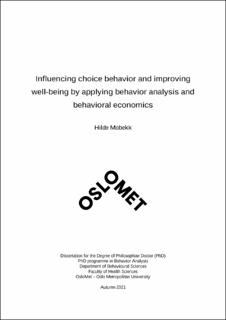Influencing choice behavior and improving well-being by applying behavior analysis and behavioral economics
Abstract
Humans possess a distinct capacity for behavioral adaption; that is why we have thrived as a species. Even though our ability to adapt is often attributed to rational choices, decades of research show that human behavior is largely explained by past and current interactions with the environment. Behavioral sciences have revealed that human behavior and choice-making are boundedly rational, systematically biased, and strongly habitual. Numerous small suboptimal choices accumulate to unfavorable long-term outcomes. Many of today's societal challenges are rooted in our behavior and controlling environmental variables. To improve society's well-being, as stated by the United Nations sustainable development goal 3, we must: "Ensure healthy lives and promote well-being for all at all ages." Since many of today’s policies, warnings, and information campaigns show only modest benefits to well-being, alternative interventions are needed. This dissertation discusses some of the challenges we face regarding well-being and how knowledge produced by behavior analysis and behavioral economics may guide actions. Study 1 is a systematic review of experimental studies to increase healthier food choices. The findings reveal that the few studies on nudging healthier food choices have limited experimental control and minor effects. Study 2 is a field experiment to improve gym members' cleaning behavior using an image of watching eyes. The findings support previous research that implicit observation cues influence human behavior. The follow-up study revealed that the salience of the stimuli faded over time. Study 3 is a field experiment that encouraged hotel guests to choose more of the healthier fish options and less meat by altering hotel lunch buffets. The findings reveal that it is essential to consider the microenvironment when utilizing nudges. Study 4 was a field experiment to evaluate the influence of nudges on hospital visitors' use of hand sanitizer. The results showed a significant increase in hand hygiene. Study 5 describes how the Norwegian cultural practice of dugnad applies social involvement in group activities to improve community well-being. The study discusses this practice from a behavior analytic perspective and how such understanding may guide action. Study 6 is a rapid systematic review of health intervention studies done via social media focusing on validity challenges. The studies reported in this thesis are relevant for understanding choice behavior and add to the knowledge on designing behavioral interventions to improve well-being on different selection levels. Mennesker har en egen evne til å tilpasse seg omgivelsene, og det er grunnen til at vi har overlevd som art. Til tross for vår evne til å tilpasse oss, viser flere tiår med forskning på valgatferd at vi mennesker er begrenset rasjonelle, og at valgene våre ofte er basert på vaner. Mange små suboptimale valg akkumuleres opp til ugunstige konsekvenser på sikt. Mange av dagens samfunnsutfordringer er forankret i vår atferd og dets kontrollerende miljøvariabler. Dersom vi skal forbedre well-being i samfunnet, som det fremgår av FNs mål nr. 3 for bærekraftig utvikling, må vi: "Ensure healthy lives and promote well-being for all at all ages." Siden mye av dagens politikk, advarsler, og informasjonskampanjer ikke gir ønskede resultater, trengs det alternative intervensjoner. Denne avhandlingen diskuterer noen av utfordringene vi står overfor i samfunnet og hvordan kunnskap fra atferdsanalyse og atferdsøkonomi kan bidra til økt well-being. Studie 1 er en systematisk gjennomgang av eksperimentelle studier for å øke sunnere matvalg. Funnene avslører at de få studiene som er gjort på nudging og sunnere matvalg har begrenset eksperimentell kontroll og at det er små effekter. Studie 2 er et felteksperiment hvor bilde av øyne ble brukt for å øke forekomsten av rengjøring av treningsapparater på treningsstudioer. Funnene støtter tidligere forskning som viser at implisitte observasjonstegn påvirker menneskelig atferd. Imidlertid viste oppfølgingsstudien at stimuli mistet effekt over tid. Studie 3 er et felteksperiment for å få hotellgjester til å velge mer av de sunnere fiskealternativene og mindre kjøtt ved å endre hotellenes lunsjbuffeer. Funnene viser at det er viktig å inkludere mikromiljøet når en skal bruke nudging. Studie 4 er et felteksperiment for å undersøke om nudging kan påvirke besøkende på sykehus til å bruke hånddesinfeksjon. Resultatene viste en signifikant økning i håndhygiene. Studie 5 diskuterer norsk dugnad i et atferdsanalytisk perspektiv, og viser til at en slik kulturpraksis påvirker well-being i samfunnet. Studie 6 er en systematisk gjennomgang av helseintervensjonsstudier gjort via sosiale medier med fokus på validitet. Studiene som rapporteres i denne avhandlingen er relevante for å forstå valgatferd i forhold til mange av dagens utfordringer, og de gir økt kunnskap om hvordan designe atferdsmessige intervensjoner for å forbedre well-being på ulike nivåer.
Publisher
OsloMet - StorbyuniversitetetSeries
OsloMet Avhandling 2021;Nr 35Journal
Skriftserien
Except where otherwise noted, this item's license is described as Navngivelse-DelPåSammeVilkår 4.0 Internasjonal
Related items
Showing items related by title, author, creator and subject.
-
On Motivating Operations at the Point of Online Purchase Setting
Fagerstrøm, Asle; Arntzen, Erik (The Psychological Record;63 (2), Journal article; Peer reviewed, 2013)Consumer behavior analysis can be applied over a wide range of economic topics in which the main focus is the contingencies that influence the behavior of the economic agent. This paper provides an overview on the work ... -
Functional behavioral assessment
Brath, Knut-Aleksander Sæther (MALKS;2015, Master thesis, 2015)Functional behavioral assessments (FBA) provide a structured and reliable measure of environmental contingencies maintaining problem behavior. It has been used to assess problem behaviors in animals, children, and individuals ... -
Contributions of Behavior Analysis to Behavioral Economics
Furrebøe, Elise Frølich; Sandaker, Ingunn (Journal article; Peer reviewed, 2017)This article discusses behavior analysis’ contribution to behavioral economics. Nobel Laureate Award winner Herbert Simon described the science of economics in an evolutionary context in A Behavioral Model of Rational ...

